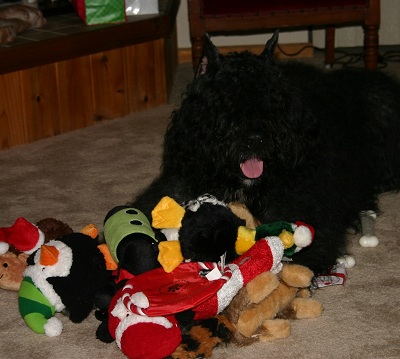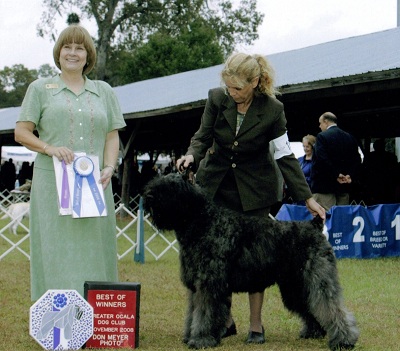BOUVIER DES FLANDRES
If there is such a thing as a perfect breed of dog, the Bouvier des Flandres would have to be it — from the perspective of a Bouvier owner, of course.
Bouviers are smart, loving, loyal, protective, calm in the house, active when given the chance to play, learn quickly, don’t shed, are one of the supposed less allergic breeds, and they are stunningly good looking. Sort of a James Bond with lots of fur.
As with most breeds, they are not for everyone, precisely because of those special qualities.
Smart, for instance. The Bouvier is definitely a thinking dog, and it’s pretty difficult to have a dog who is smarter than his owners. Bouviers learn quickly what they are taught, and they also learn to read – and play – their owners.
As for being theoretically less allergic, it’s because they don’t shed large quantities of hair twice a year as do some breeds. Instead, their coat is constantly turning over. The soft undercoat gets caught up in the outer guard hairs. If they aren’t groomed regularly, you will have a major mat problem and may need to shave them down. You will find “Bouvie bunnies” blowing across the floor on a daily basis, some the size of mice. We keep a portable vacuum around to catch them as they glide across the tile floor in the breeze. Really, though, there is no hypoallergenic dog.
The beautiful Bouvier face has an alert gaze, that is, if you can see his eyes. His beard is alternately impressive and stinky. This breed is known in its home area of Belgium, Holland and northern France as Vuilbaard (dirty beard), koehond (cow dog), and toucheur de boef (cattle driver).
The Bouvier is a working breed, in the AKC Herding classification, and today he can be found as a police dog, service dog, family friend, child’s playmate, and farm dog. Temperamentally, he is steady, resolute and fearless. Physically, he is square built, strong boned, well-muscled, and straight. The coat is a tousled double coat in a color from fawn to black, including pepper and salt, gray and brindle. Chocolate brown, white or parti-colored is to be severely penalized.
Depending on the individual dog, Bouviers enjoy obedience, agility, nose work, rally, herding, carting and schutzhund.
Buyers need to do their homework. Fortunately, the Bouvier is not a common breed, so you are not likely to see one in a pet store. If you do, walk away quickly.
The AKC breed club is the American Bouvier des Flandres Club; there is also the North American Working Bouvier Association. Both clubs have lists of breeders who follow their codes of ethics. ABdFC also has a rescue branch.
In looking to buy a Bouvier, you must do your homework. There are potential health complications and good breeders test for heart, hips, elbows, eyes, and thyroid.
And once you have your Bouvier at home, you need to get serious about training and socializing the little baby – using positive training methods only. The Bouvier does not do well with force training. Socialization is also extremely important. It is said that in the first three months of life, a puppy should experience people of different ages, races, abilities, and disabilities, along with cars, bicycles, wheelchairs, motorcycles, stairs, and sounds.
Along the way, there will be people willing to mentor new owners – either a member of this club, your breeder, a trainer, or a dog-savvy friend.
In choosing your puppy, you should consider that he will be similar to his parents in looks, temperament and personality. If you have children at home, it would be good if the breeder had his puppies interact with children. Same if you have cats or other pets.
If you would like to show, you need to let you breeder know this in the beginning so your breeder can choose a show puppy for you, although no one can tell for sure whether a puppy will turn out to be a champion. If you want to “work” your dog, look for a breeder whose dogs are active.
|
|
 |


